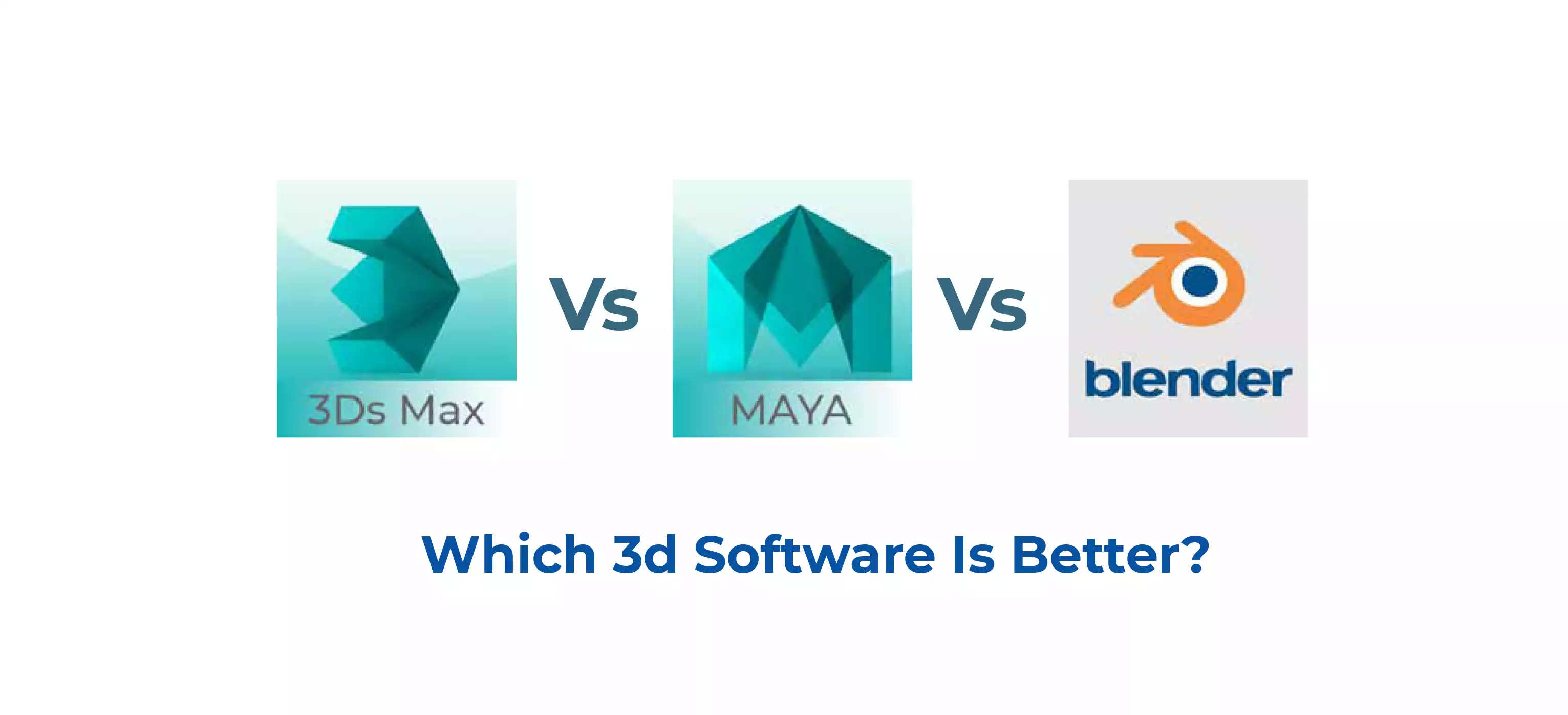 Ghanashyambhai Bhagvanbhai Vaghani
Apr 16, 2025
Ghanashyambhai Bhagvanbhai Vaghani
Apr 16, 2025

Maya, 3ds Max, and Blender are popular 3D software used by artists and animators around the world. While they share many features, there are also some notable differences. Maya is known for its powerful modelling tools and advanced animation features. 3ds Max is favoured for its ability to create highly detailed environments and characters. Blender, on the other hand, is unique in its approach to 3D modelling and animation, offering a more intuitive workflow.
According to the Bureau of Labor Statistics, jobs related to special effects arts and animation will grow 4% from 2019 to 2029. The median annual wage for special effects artists and animators was $99,060. Meaning, that expertise in Maya, 3Ds Max or Blender can land you in a well-paying career, especially for those with strong skills and experience.
So which 3D modelling software is the best? Maya, 3DS Max or Blender? Choosing the right one can depend on various factors and the type of industry you are working in. 3D modelling is constantly moving and changing, and it’s important to stay ahead of the curve. Let’s take a look at each 3d modelling software to choose the best opinion.
Maya, 3ds Max and Blender, this three software perform the same or similar functions in different ways or at special depths. They each hold an advantage over the other. 3Ds Max is a more versatile graphic due to the Presence of plugins used by professionals in all works of life but can only function on the Windows platform. The Fundamental difference between 3Ds Max, Maya, and Blender is that Maya and 3Ds Max are products of Autodesk and only on Windows with specific requirements. It is hard to choose between the three popular 3D software programs.
Here is a comparison table of 3ds Max, Maya, and Blender based on their features, usability, and other key factors:
| Features | 3ds Max | Autodesk Maya | Blender |
| Platform | Windows only | Windows, macOS, Linux |
Windows, macOS, Linux
|
| Ease of Use | Moderate learning curve | The steep learning curve for beginners |
Beginner-friendly; customizable UI
|
| Modelling | Excellent for architectural and detailed modelling | Advanced organic modelling and rigging tools |
Flexible with extensive modifiers and sculpting tools
|
| Animation | Limited animation tools | Industry-standard for animation and rigging |
Strong animation features but less advanced than Maya
|
| Rendering | Supports Arnold, V-Ray, etc. | Includes Arnold renderer |
Eevee (real-time), Cycles (ray tracing)
|
| VFX/Simulation | Good for architectural visualization effects | Advanced VFX capabilities (e.g., explosions) |
Strong VFX tools; including motion tracking and compositing
|
| Community Support | Moderate community size | Large professional community |
Extensive open-source community support
|
| Use Cases | Architecture, product design, games | Film production, AAA games, commercials |
Indie projects, small studios, personal use
|
| Cost | Paid: ~$1,700/year | Paid: $245/month or $1,945/year |
Free and open-source
|
Now, let’s check out each 3D modelling software and find out which is the best;
Autodesk Maya is a powerful 3D software used to create digital assets for various media, including films, video games, and commercials. It enables the production of lifelike visuals through the manipulation of 3D objects. Maya empowers artists to develop compelling character animations, sculpt intricate 3D models and environments using user-friendly tools, and generate realistic simulations of phenomena like explosions and cloth movement.
Here are some features of Maya;
With its outstanding motion-capture capabilities, Maya is often the first choice for the film industry. Maya is used by popular entertainment companies including Pixar, Industrial Light & Magic (ILM), Weta Digital, Disney, DreamWorks Animation and Sony Pictures Animation.
The Autodesk Maya software has been used to animate award-winning movies such as “Frozen” and “Wreck-It Ralph.” Autodesk Maya is widely used in the entertainment industry. For example; Framestore's Practically Perfect VFX for “Barbie” was done using Autodesk Maya.
Maya was used to create character models, facial animations, and environmental assets in The Last of Us game series.
Blended is a 3D Computer graphic software. Bender is a publicly accessible software, which can be downloaded and used by both professionals and Newbies. This accessibility makes blender update handles to be done by a community that uses blenders instead of the third party, thereby improving the software, fixing bugs, and all sorts of improvements happening faster than most Conventional software.
Blender has been used to create several popular films, including Next-Gen, Spring, and I Lost My Body. These movies showcase Blender's versatility in producing high-quality animations and visual effects.
Blender in Game Development
Blender's primary use in the modern game development pipeline is asset creation for other game engines, some games have been developed using its built-in game engine (originally the Blender Game Engine - BGE, and now its community-driven fork, UPBGE). Here are some of the latest games that have been developed or are in development using UPBGE:
3D Max is a professional 3D studio max 3D computer graphics program for making 3D animations, images, games, and so, on. It was developed by Autodesk Media and Entertainment. Character modelling and animation as well as creating lifelike representations of architecture and other things are common uses for the 3Ds Max software.
Today, the job roles that require 3ds max skills in 2025 span a wide range of industries and specializations. These include Entertainment, Game development and Architecture.
3ds Max is used to create computer-generated imagery (CGI) for films, including character animation, set extensions, and special effects. Notable films like Avatar and 2012 incorporated CGI created with 3ds Max alongside live-action footage.
Use Cases in the Game Industry
3ds Max is extensively used to model and texture game assets such as characters, weapons, vehicles, and environments. The software provides tools for rigging and animating characters and objects for games.
It's clear that 3DsMax, Blender, and Maya are of great importance and similar purposes but their class, personnel handling them, the budget, and the aim of such personnel on which of the software is being used. Maya and 3DsMax are the most used and favourites despite the open-source nature of Blender. Most professionals still prefer 3DsMax and Maya one can infer that this is a result of the great quality of results achieved using them.
There are numerous career paths for 3DS Max Professionals. The best way to choose the appropriate one is to investigate all of your alternatives and determine what you are most passionate about. Maya and 3DsMax are used mainly for their high quality, despite requiring payment to have them. While Blender is open and highly accessible to all, it's the best software to go for, for a newbie as you stand to lose nothing. Blender can be used for almost if not all 3D works, though with a "questionable quality", as Blender is mainly used by rising organizations, whose aim isn't high quality but growth and business sustainability.
3D modelling is becoming increasingly crucial across industries, from architecture to gaming. It's not just about creating cool visuals; it's about solving real-world problems. Today, there are many 3d modelling certification courses to boost your career available in the market. With the comparison we have done between 3DS Max, Blender and Maya, you can choose the best one that aligns with your carer goals.

Graphic & 3D Visualization Trainer
Ghanashyambhai Bhagvanbhai Vaghani is a Graphic & 3D Visualization Trainer with over 15 years of training experience. His expertise spans multiple disciplines, including interior design, graphic design, 3Ds Max and UI/UX development. Ghanashyambhai is an Adobe Creative Suite Specialist with expertise in Photoshop, Illustrator, InDesign, Premiere Pro, After Effects, and Blender. He is also a highly sought-after corporate trainer with exceptional skills in digital content creation and architectural visualization. During his career, he has guided over 5,000 students through professional design education.
He holds a Diploma in Animation and Visual Effects from Frameboxx India and has served as faculty at prestigious institutions, including IIFT and IDT India. His experience with E Train India has further refined his ability to deliver effective technical training. Ghanashyambhai employs a practical, project-based teaching methodology. His approach combines technical training with real-world applications.

Ghanashyambhai Bhagvanbhai Vaghani

Ghanashyambhai Bhagvanbhai Vaghani

Ghanashyambhai Bhagvanbhai Vaghani